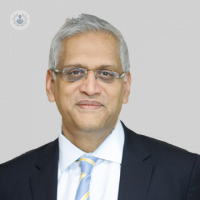Gallstones: Do I need gallbladder surgery?
Written by:Gallstones are very common, and up to 30 per cent of the population can actually have them. However, you only need to have your gallbladder removed if you develop symptoms and complications.
Here to provide an expert insight into gallstones and gallbladder surgery, including how surgery is performed and what is the recovery time, is Professor Ameet Patel, leading consultant general surgeon in upper GI surgery based in London.

What are the symptoms and possible complications of gallstones?
Symptoms of gallstones include pain in the abdomen, particularly after eating a fatty diet, and this pain can spread to the back and to the shoulder blades.
Complications from gallstones also include infections of the gall by the wall itself, in which the wall of the gallbladder becomes inflamed and - in severe situations - can perforate and lead to fluid accumulating around the gallbladder. These gallstones can also travel and get stuck in the ducts from the gallbladder, causing obstructive jaundice, in which the skin becomes yellow and your stool becomes pale and the urine becomes dark.
More seriously, these stones can become stuck in a duct of the pancreas leading to pancreatitis, which is inflammation of the pancreas in the abdomen. This is a serious condition, and has a certain amount of mortality associated with it. All in all, about three per cent of people with gallstones develop these symptoms and complications.
How gallbladder surgery performed, and what are the risks?
Nowadays the vast majority of gallbladder operations are performed laparoscopically or via keyhole techniques. This is when we use small instruments and cameras which enter the abdomen by small incisions, meaning the patient experiences less pain and the surgeon gets a better view of the surgical field. This is important to avoid cutting off the incorrect structures.
When performing laparoscopic surgery, there is a risk that we can cause damage to internal organs such as the bowel or blood vessels, which we can generally fix via the keyhole technique.
In certain circumstances, we may have to make a big incision - in particular, when we take out the gallbladder. When we do this, we must also cut the duct that it is attached to. However, there are many other ducts in that area, and if any of these are cut, it can become a serious complication. The risk of this complication occurring is approximately 1 in 300, but if we cannot fix that duct damage there and then, we would have to send the patient to a specialist unit to have that repaired which would be major surgery.
What are the side effects of having your gallbladder removed?
If there has been some doubt as to whether or not these gallstones are symptomatic, or if there are co-existing bowel problems, then the most common side effect would be a continuation of the same symptoms as before surgery.
However, up to 30 per cent of people can develop diarrhoea following gallbladder surgery. This is because the gallbladder acts as a store for bile, which has been secreted by the liver and is important in fat digestion.
Are there any foods and drinks to avoid after surgery?
Once a gallbladder is removed, instead of the bowel being secreted in response to fatty foods, the bile is being continuously created in a drip-like function into the bowel itself. Most people will recover from this, but I would suggest that everyone needs to reduce the amount of fat in their diet to about 40 grams per day. For example, one egg contains about four grams of fat. They can then aim to go back to a normal diet within a month after surgery or as their diarrhoea resolves.
In very small numbers of patients, they may require continual medication for their diarrhoea. If there have been no side effects from the surgery, then there's no need to make a permanent change to your diet.
I've been asked many times by a patient if they can drink alcohol. There is no reason why you can't drink alcohol, but of course, if you're on pain medication following surgery, you need to avoid this.
What is the recovery time following gallbladder surgery?
Most patients after a gallbladder operation can return to work after one week. Given that gallbladder surgery is performed via laparoscopic techniques, we want to reduce the risk of hernias forming in the incisions of the abdomen. Therefore, I always tell all my patients to avoid heavy physical labour for at least two weeks. In terms of driving, they can practise doing an emergency stop in the car while it's stationary, and if they can do this, then they can start driving.
Professor Ameet Patel is a highly skilled consultant general surgeon with over 30 years of experience.
If you require gallbladder surgery and you would like to discuss your options with an expert, do not hesitate to book an appointment with Professor Patel via his Top Doctors profile today.


